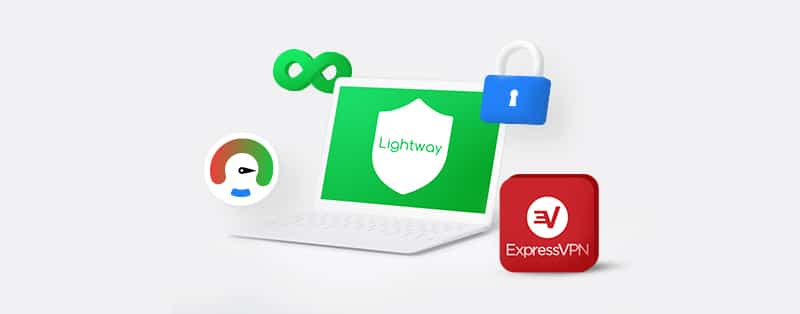Meet Lightway, the Newest VPN Protocol From ExpressVPN

VPN protocols have come a long way since the Point-to-Point Tunneling Protocol (PPTP) was developed. Newer and more effective protocols have been developed, building on the previous flaws. Now, many VPN protocols offer different levels of privacy, security, and reliability, but have you heard of Lightway?
Lightway is the latest, next-generation VPN protocol. While Firewalls and network admin can easily block many other VPN protocols, Lightway is built to get around such problems and make it easier to stay protected online. In this article, we’ll introduce Lightway to you and show you what the hype is all about.
What Is The Lightway Protocol?
Lightway is the newest VPN protocol that the VPN service provider, ExpressVPN, developed. Although the company gives users the ability to use other protocols, they decided to create theirs.
According to the company, Lightway is designed to make your VPN experience a lot faster, more secure, and more reliable than it used to be. ExpressVPN says that the protocol is lightweight (as the name suggests), uses less battery, runs faster, and can be easily audited and maintained.
Lightway facilitates instant connectivity because it is not limited by certain features standard protocols have. As a result, it reduces the load time you’ll normally experience, but it also depends on your network. Additionally, it uses less processor power, and this improves your battery life.
This protocol’s smaller size improves the quality of performance. In addition, it uses a state-of-the-art security system and also facilitates uninterrupted connectivity. At the moment, Lightway is available on the ExpressVPN apps for Android, iOS, Windows, Mac, Linux, and routers.
Features of Lightway Protocol
Here are a couple of features that make Lightway protocol one of the best available at the moment:
Security
Lightway has ExpressVPN’s standard safety features: 256-bit encryption, leak protection, a kill switch, and a no-log policy. Also, rather than build a whole new cryptography library, it uses the battle-tested and trusted wolfSSL.
WolfSSL is a well-known cryptography library tested by security experts against the FIPS 140-2 standard. Government agencies such as the NSA use this same kind of security to protect their website data.
You also get an option for ChaCha20 on your mobile devices. ChaCha20 is a lot faster than the regular AES-128-GSM, so your web pages will open faster, and your mobile device won’t take up much battery. In addition, the ChaCha20 ensures your mobile devices get fast encryption if they don’t support AES acceleration. It also ensures perfect forward secrecy, with dynamic encryption keys that are constantly changed.
Lightway is easy to audit and maintain. ExpressVPN has made its core codebase available for preview on GitHub. That means that security issues or bugs can easily be taken care of.
Stability of Connection
It is common for your phone to experience network changes as you switch the network or in certain locations where you would lose reception, like in an elevator or a tunnel. Legacy VPN protocols don’t handle such situations perfectly, but it is different with Lightway.
Lightway ensures that you always stay connected to the VPN even when your network switches or drops unexpectedly. This helps you stay protected all the time without having to reconnect to the VPN server. Lightway switches your network to ‘idle,’ and once your network returns, it automatically connects to the VPN.
Not only does Lightway run on UDP (User Datagram Protocol) protocol, but it also supports TCP (Transmission Control Protocol). Although UDP is faster than TCP, it can provide better connections on specific networks.
Enhanced Performance
Lightway does not have certain features that are common with other major protocols. Instead, it has a lightweight codebase that is made of about 1000 lines of code. Other VPN protocols such as OpenVPN have longer lines of code (70,000 lines for OpenVPN).
Lightway establishes a VPN connection in less than a second, depending on your network. And once you’re connected to the VPN server, you will experience faster internet speeds as well. The light codebase also translates to less processor load, so your battery won’t run down quickly while you try to protect yourself.
Benefits of Lightway Protocol
Using the Lightway protocol has several benefits. Some of which include:
Compact Design
Lightway was developed with a codebase of about 1000 lines of code that anyone can easily audit. This compact design makes it difficult for attacks to occur. It also saves you some battery life.
More Stable Connections
Lightway handles connections in a more efficient way than legacy protocols. With older protocols, your connections will be terminated if there’s any form of interruption. However, rather than break the link, Lightway places the connection as idle. This means that once your network is restored, your VPN connection will be re-established.
Speed
Lightway also facilitates faster VPN and internet connections. In other words, when you open the app, you can connect to a VPN server faster than other protocols. And once the connection is established, you still get to experience faster connection speeds. However, this depends partly on your network.
Streaming and Torrenting
With top-security and fast connections, Lightway gives you the best of your streaming and torrenting experience. You can watch or download your videos without lagging or buffering.
It Maintains Perfect Forward Secrecy
By design, Lightway does not recycle encryption and decryption keys. Instead, whenever a new device connects to an ExpressVPN server, the server and your device use different encryption and decryption codes for the connection. That way, it would be impossible for hackers to figure out the codes used for your connection or to intercept your data traffic.
Device Compatibility
Lightway is available on the latest ExpressVPN apps on major operating platforms such as Windows, Android, macOS, iOS, Linux, and routers.
Security
Lightway uses the wolfSSL to secure connections. This offers you the same high level of security that the government uses. However, it also guarantees that your privacy and security are maintained.
Disadvantages of the Lightway Protocol
To be honest, there is hardly anything you could find wrong with the Lightway protocol. However, some drawbacks with Lightway protocol includes:
Limited Support
A major drawback of Lightway protocol is that you can’t find it on many VPN clients. VPN providers offer many VPN protocols. However, Lightway’s reach is limited. Only ExpressVPN uses Lightway at the moment.
No Built-In Obfuscation
It is necessary to hide your VPN connection sometimes because firewalls and network admins could block your connection. Unfortunately, Lightway doesn’t have a built-in obfuscation feature at the moment, so some firewalls may be able to detect that you’re using a VPN. However, you can enable VPN obfuscation on the ExpressVPN apps.
Lightway VPN Protocol Versus Other VPN Protocols
Lightway is new to the scene, but it offers outstanding features like other prominent VPN protocols. Let’s take a closer look at how Lightway protocol compares with some VPN protocols:
Lightway vs. OpenVPN
OpenVPN was released in 2001. It is an open-source VPN protocol. It is available on all platforms and is popular among VPN users. OpenVPN is one of the most secure VPN protocols. Like Lightway, OpenVPN is compatible with several encryption ciphers such as AES and ChaCha20.
Lightway and OpenVPN work perfectly with TCP and UDP communication protocols. TCP helps both protocols effectively bypass firewalls, but UDP increases the connection speeds.
Lightway is faster than OpenVPN. This, in part, has to do with the fact that Lightway has fewer codes than OpenVPN. Additionally, OpenVPN is more battery-consuming and unstable than the Lightway protocol.
Lightway vs. WireGuard
WireGuard and Lightway use ChaCha20 and other modern encryption algorithms to enhance your privacy and security. They also have fewer lines of code, unlike other protocols such as OpenVPN.
Their simple codes allow for enhanced speeds. As a result, VPN services that use either of the protocols boast some of the fastest connection speeds. Another area of similarity is the stability of the connections. Both protocols can switch between networks and handle connection drops better than OpenVPN and other protocols.
However, Lightway uses wolfSSL encryption and the ChaCha20 cipher while WireGuard uses the Noise protocol. Nevertheless, both encryption libraries are modern, top-tier encryption frameworks that boost efficiency, portability, and speed.
Another major difference between WireGuard and Lightway is that Lightway is limited to only one VPN provider (ExpressVPN). In contrast, several VPN services have adopted WireGuard. For example, NordVPN’s version of WireGuard is known as NordLynx.
Choosing between Lightway and WireGuard can be a tough one because of their multiple similarities. However, if you don’t mind subscribing to ExpressVPN services, Lightway is a great choice. ExpressVPN is currently the best VPN provider out there, so you would not be missing out on any feature.
Conclusion
The Lightway protocol is a new-generation innovation that is already contending with other VPN protocols already in use. It assures users of a better-improved VPN experience with a robust security system, faster and more stable connections.
Lightway is an excellent option if you’re focused on speed, security, and reliability. However, you’ll just need to subscribe to ExpressVPN to use it.
Related Posts
- How to Setup and Use ExpressVPN on Firestick
- How to Set Up and Use ExpressVPN on PS5
- What Is Layer Two Tunneling Protocol (L2TP)?
- Best VPNs With WireGuard Protocol in 2024 (Most Secure VPNs)
- Comparison of VPN Protocols
- What Is SSTP? (Your Guide to the SSTP VPN Protocol)
- What Is SoftEther? (Complete Guide)
- What is the IKEv2/IPsec VPN Protocol?
- Does ExpressVPN Work With Netflix Japan? (Updated 2024)
- How to Setup and Use ExpressVPN on PS4 (2024 Guide)

